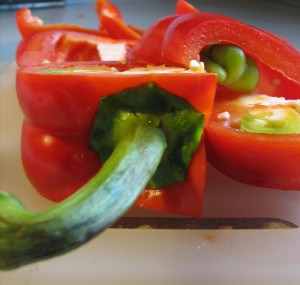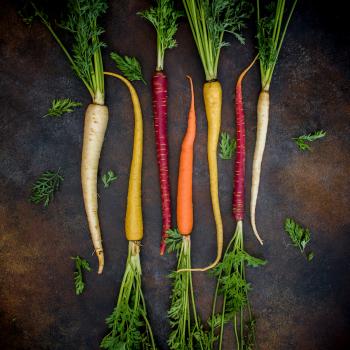 A year ago, I started cooking and learning how to prepare and love food in new ways. How to spend time with it, think about how it comes apart and together, how it draws lines back to heritage and times when I loved my insides, when love had all kinds of ungraspable meanings.
A year ago, I started cooking and learning how to prepare and love food in new ways. How to spend time with it, think about how it comes apart and together, how it draws lines back to heritage and times when I loved my insides, when love had all kinds of ungraspable meanings.
I’m lucky to have a family that taught me that food was pleasure, that if you ate for nutrition only, one day you’d return your carotids to the good Lord, who’d spread them with his mighty hands, inspect their immaculate insides, and ask what on that delicious earth you’d done with your life.
Paella. Extra saffron for the vermilion color that makes me think of mercuric sulfide. Pretend poison. The coral threads were a gift, and I have to use it up before it’s useless, conserved and tasteless.
Chorizo, the fat and fiber melding with the lush gore of the battle scenes on Game of Thrones as I eat late at night, until I have to throw the rest away. Green and red bell peppers; when I had a regular salary, I’d chop off the top and throw it away; now that I freelance, I cut carefully around the stem.
I read an article in the local paper over a man’s shoulder on the bus about why we kiss: the sensory nerves in our mouths make tasting something the best way of gathering information about it. I read idly, there also for the smell of his shampoo in the cold air—spearmint, clove, licorice. The rough wool of his coat.
It’s Valentine’s Day. Outside, trees bow with ice, everything white and glittery, and my optic nerves scream with pain and consent wholeheartedly.
Lassis for breakfast, yogurt, almond milk, and cardamom. Christmas at my great-aunt’s with great loaves of spiced bread my mom learned how to bake for her Swedish husband. Honey heated until it thickens, stirred with cinnamon, spread on toast with the homemade farm butter that comes wrapped in loaves you have to pick up with both hands.
Cheese washed with beer or whiskey. Tannins I’d temper with chocolate when the temperature fell low enough to make extra bitterness impossible to stomach, but craved in the heat.
When I first started experiencing my heart arrhythmia, I craved blood, wanted the rare burger that a month before would have sent me into a cold panicky sweat, wanted to suck the sponge that rested under the meat from the butcher (but didn’t). It wasn’t just the flesh and blood itself, but the cruelty, the brutality, of meat.
I still don’t understand where this urge came from, if it was my body saying look at the blood, the nearly live and red flesh, there’s something wrong with yours. If it was just a desire to take and consume, to feel powerful and alive, when something inside was trying to run away.
The Last Supper: what on earth did they think of such a request? I imagine saying something of the sort to my friends. A colleague calls the Eucharist savagery, as if the desire for flesh, for consumption, is perverse.
Adoration, latria. It’s all in where you direct your gaze, your runaway heart.
In my childhood church, Eucharist was symbol, the idea of flesh permeating bread or being somehow in the bite of it considered silly, though we weren’t allowed to bite. I did anyway, because I refuse not to enjoy food. In my church now, you can sign up for adoration shifts at Lent. They decorate the church like a garden and you can steal out in the middle of the night to spend a half-hour with the bread.
“Batter my heart, three-person’d God”—I can’t say it without thinking of pancake batter, and my heart might well be battered. Last summer, St. Paul’s crumbling under-city pipes continued their onslaught of calcium, manganese, and iron, so I had to put my hair up and clean all the drains of sediment. Learn to love everything, I told myself in the mirror as I applied my pre-drain-cleaning hot pink lipstick (necessary).
Praise what’s underneath and unearthed, praise the turbulent hydraulics of polyvinyl chloride and mitral valve. Afterward, I made pancakes, watching, as my dad taught me, for the surfaces to bubble up before flipping them with sore arms.
But, oh, pancake batter aside, I love John Donne, his relationship with God made physical unto himself, his receptive flesh and senses. He fought against the idea of a boring God. Oh, Catherine of Siena, oh, Prince Rogers Nelson, where are all my sexy saints, my patrons of the cheeky fight against boring faith.
God loves a bit of cheek, I think, if all the prophets are to be believed. We show our stripes with food and drink, what binds us to our ghosts, holy or just gone and missed.
Home is food and vernacular, the words and ingredients you use and know and are teased for.
Home is ice and rust and iron and donuts broken in half after church, dunked slowly into the weak coffee my grandpa will drink with what’s known as a “Minnesota slurp.” Pleasure of word-feel on the tongue, later consumed, connecting me to family: honeymooners and potica from the small bakeries, melk in gallon jugs, crawdaddies plucked from river’s mud. My mother dropped bagels into boiling water on weekends, made date bars every Saturday, vegetable pizza and caramel rolls and banana cream pie for my birthdays.
Summer morning air thick with yeast, its colonizing desires, lush and heady, until I see the baby in NICU breathing against the ventilator, overcome by being opportunity for a pathogen. I can never equalize the equation containing pleasure and suffering; I can’t face it. Just go on by, I think, everything is both—learn to love everything.
I can’t tell if I’m seeing beauty all around or fading into apathetic equanimity.
My small allergies: coffee oils unfiltered by a metal press. Strawberries that prickle at my tongue. Turmeric and its nightmares, ginger and the crescent welts that bloom on my cheekbones. I’m not one smart enough to stop, is what I’m saying.
Give us this day our swell and prickle, our nightmare and red arc, our scream and whole-hearted consent.
Natalie Vestin is a health scientist and writer from Saint Paul. Her essays have appeared in The Normal School, Iowa Review, Prairie Schooner, and elsewhere. Her chapbook Shine a Light, the Light Won’t Pass is forthcoming from Miel Books.
Image produced above is by Barbara Samuel, licensed by Creative Commons.

















